Are India's 'Uber for tour guides' on the right track?
- Published
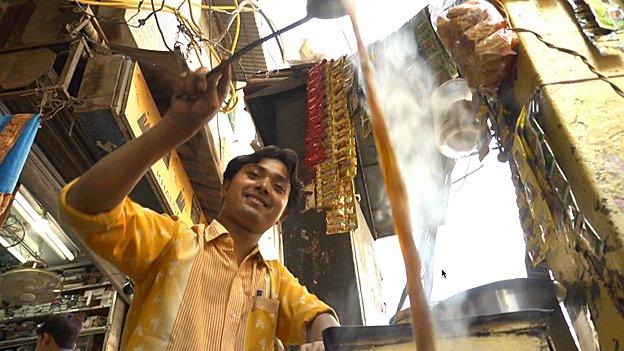
A chai wallah making tea - a guide can help tourists experience the real India
If you really want to rub your face in old India then Delhi's Chandni Chowk is your place.
It's a sprawling labyrinth of stalls selling every possible spice, mountains of nuts, sweets and incredible street food.
And when you're done eating, you can sip sugary tea and get your sandals splashed by a chai wallah (someone who sells tea), defying gravity with boiling liquids.
There are two ways to experience the place: get pulled along by the coursing crowd, or find out what's really hidden in its maze of alleyways with a guide.

Chandni Chowk has hundreds of stalls selling every variety of spice, nuts and sweets
I met up with Prabhjot Kaur.
She is no ordinary guide. During the week she works as an independent human resources consultant, but at weekends she indulges her passion for travel, history and culture, working as a guide.
"I do this because I like connecting with people," she says.
"I like to understand more cultures - where you can really get to meet people from different origins."
David Reid meets the Delhi tour guides you can book online
Providing a platform
I got in touch with Prabhjot through Padhaaro - one of a number of start-up websites in India connecting tourists to guides.
You scroll down a list of "experiences", which range from Royal Enfield rides and Segway tours, to meeting street kids through a local charity. The site then puts you in touch with your guide.
For Prabhjot it has meant she has been able to buy into a simple formula: if you can't earn a living doing what you want, at least you can earn part of a living doing what you want part-time.
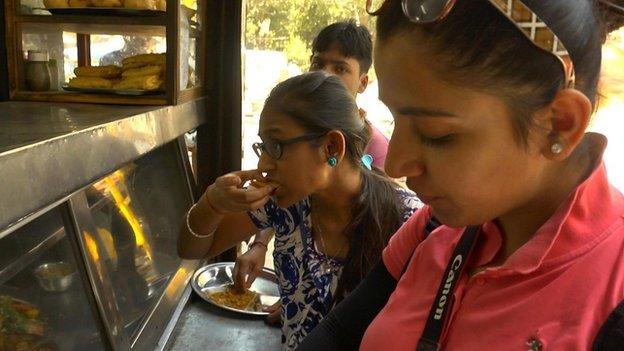
Spicy street food is an essential part of the tour
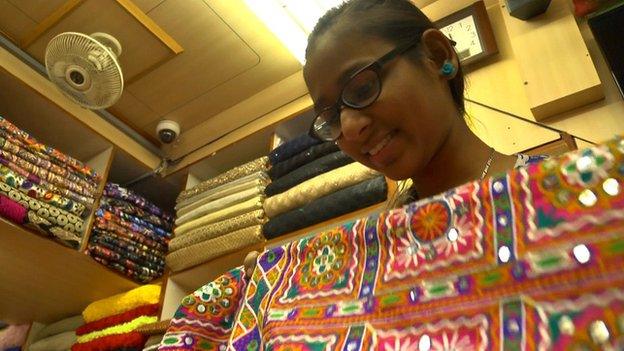
Akanksha is in retail heaven in a Chandni Chowk fabric shop
"If I would like to connect up with people myself, I would need a lot of capital to invest in a website and a platform to market myself," she says.
"Padhaaro is giving me that platform where I can get connected to such people."
Joining us on our tour of the market was Akanksha Rastogi. She is a programmer based in Delhi's hi-tech satellite, Gurgaon. She loves to shop, and was brimming with praise for Prabhjot's itinerary of fabric boutiques.
"She is fantastic. I love her company," she beams. "I am enjoying shopping. Going to different places and buying stuff."
While it's obvious that both Akanksha and Prabhjot are getting something from a business that connects individuals offering a service with those looking for one, how different is this kind of tourism from the more traditional kind?
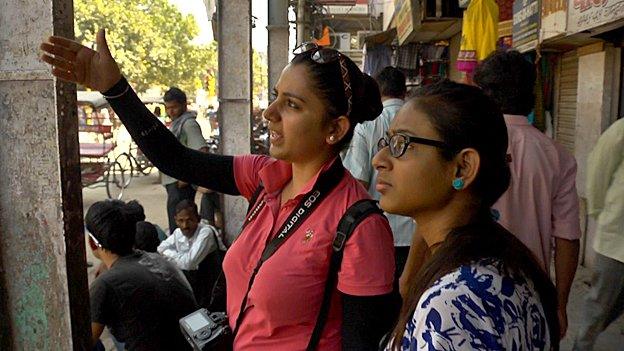
By using a guide, tourists can see things they might not otherwise have access to
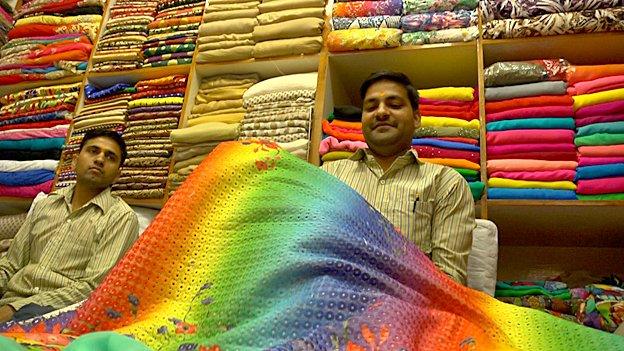
Shopping and getting a good price can be easier with a bit of local knowledge
People, not just places
On the other side of Delhi I met the co-founders of another site, SeekSherpa.
Dhruv Raj Gupta feels there is something special about taking a tour with someone for whom it is a passion, rather than just another day at work.
"The person taking you around is as much value as the place he is taking you to," he says.
"We want the person's personality to be really powerful and as much as part of the tour as the place you are going to is."
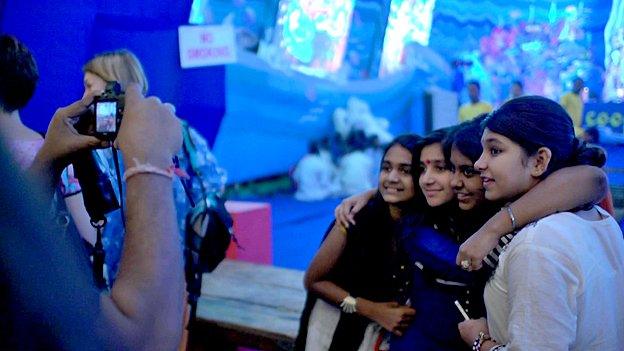
Tourists take pictures of themselves
The idea then is that an expert, history buff or even local resident is going to offer tourists insights and enthusiasm missing from the well-rehearsed spiel of a jaded tour guide.
The currency these sites are trading on is authenticity. But is authenticity enough to build a business on?
There are doubts. The model might work for tourist and guide, but the website's cut, about 20-30% on each transaction, might not be enough if the volume of tourists is low.
As Piyush Mathur, the president for the consultancy Nielsen in India, suggested to me, the market for tour guides may only be large enough to support one player, if that.
"I think there is always a first mover advantage in any start-up," he says. "Margins are fairly thin, even negative, in the beginning.
"It is not just about working a business model and hoping that at some point it will come. I think at some point in time, you have to start showing that this business model is working."
Regulatory hurdles
Another problem with the online model is that sites like these are essentially brokers. They are using ad-hoc workers who themselves become mini-businesses.
If this all sounds familiar, it's because web-based taxi firms such as Uber work a similar model - acting as middlemen for cab drivers.
This does not augur well in the Indian context.
A recent rape allegation against an Uber driver in Delhi shone a spotlight on the potential hazards of inadequate vetting, when your company pitch is to open up an industry to all-comers.
The Indian government wasted little time in banning all online taxi firms.
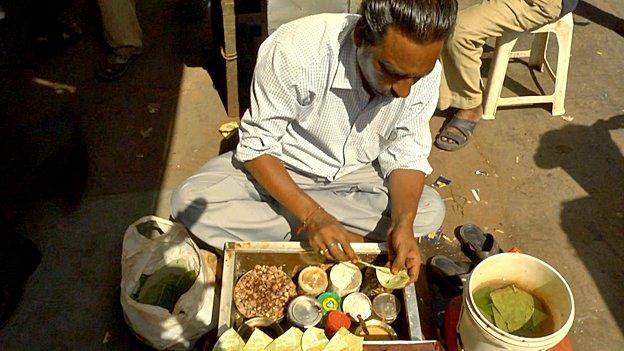
Visiting the pan seller: the online model uses ad-hoc workers who themselves become mini-businesses

Go with the flow or take a guide
Tourist safety is a sensitive issue in India. It was underlined only last week, with the emergence of allegations from a Japanese student that she was abducted and repeatedly raped during a month of captivity. Police said two men had approached the victim as tour guides.
"Indian rape case echoes claims of tourists as prey" ran the headline in the New York Times, external.
The question for websites connecting tourists to local guides is whether they will be vulnerable to regulatory oversight amid these wider safety concerns.
SeekSherpa's other co-founder, Sukhmani Singh, admits: "There are legal and regulatory issues that might crop up."
However, she is confident that India's Ministry of Tourism will see their business model "as more of a boon than a bane, and is going to be on our side".
Perhaps a guided tour is a fundamentally less sensitive business compared to ferrying people in a closed taxi.
These are the kinds of regulatory challenges truly disruptive business models throw up. To succeed start-ups have to overcome them.
- Published6 January 2015

- Published2 January 2015

- Published30 December 2014

- Published26 December 2014

- Published2 December 2014

- Published18 December 2014
